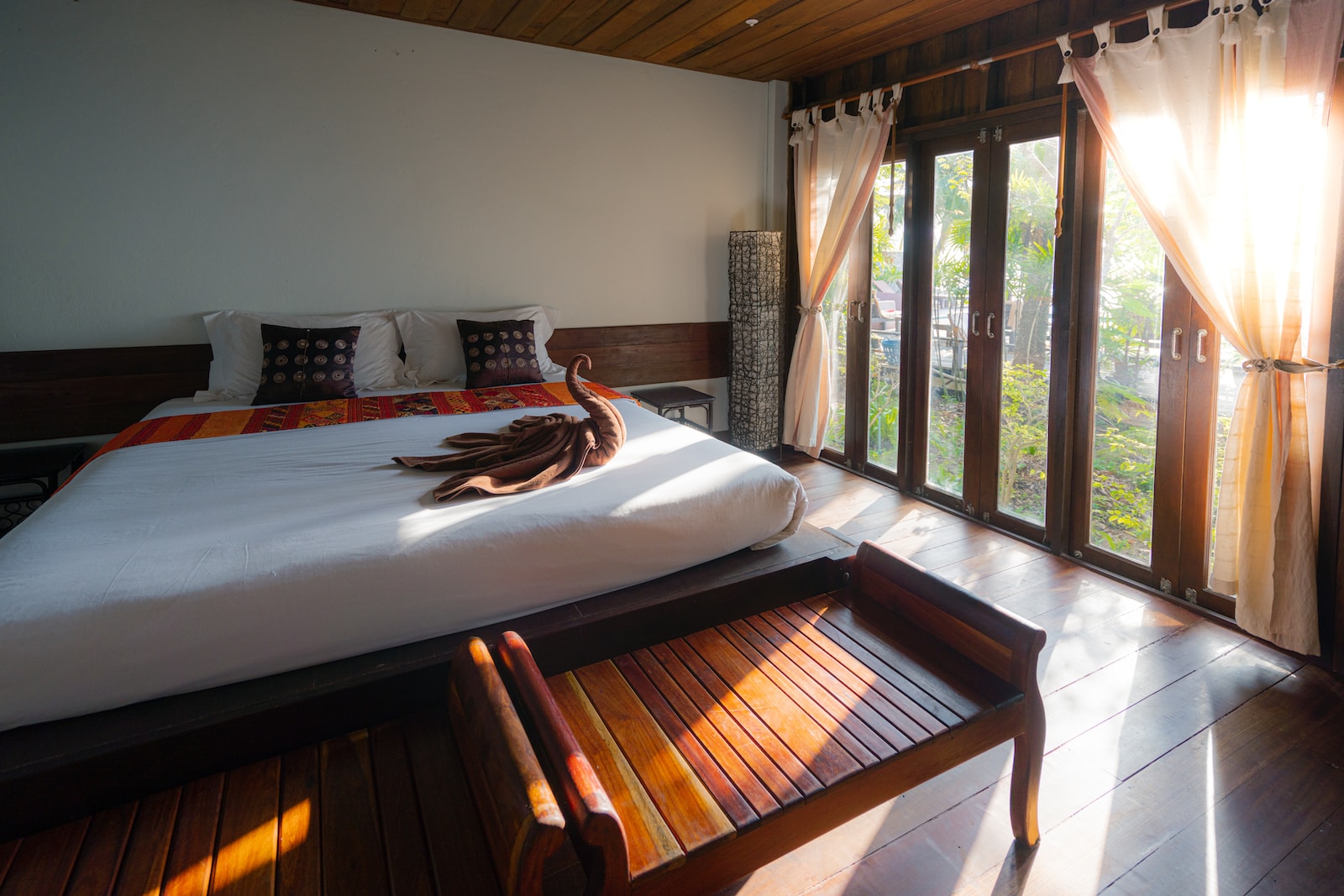Hotels have been around for centuries, offering weary travelers a place to rest and rejuvenate.
While hotels come in all shapes and sizes, one aspect remains consistent across the industry: the interior design of hotel rooms.
All hotel rooms look the same, from the color scheme to the layout.
This phenomenon is not a coincidence but rather a deliberate design strategy hotel chains use to create a sense of familiarity and comfort for their guests.
Why Do All Hotel Rooms Look The Same?
There are several reasons why hotel rooms look the same.
Firstly, hotel chains strive to create a consistent brand image across all of their properties, and one way to achieve this is through standardized room design.
Using the same color schemes, furniture, and layout in each room allows guests to easily recognize the hotel chain and its brand, regardless of where they are in the world.
Secondly, standardized room design allows hotels to streamline their operations.
With identical rooms, hotel staff can easily maintain and clean them, reducing the time and resources needed for training and maintenance.
This ultimately leads to cost savings for the hotel, which can be passed on to guests through lower room rates.
Lastly, standardized room design provides guests with familiarity and comfort.
When guests enter a hotel room that looks the same as the one they stayed in before, they feel at home and can quickly settle into their new environment.
This is particularly important for business travelers and frequent hotel guests who want to minimize stress and maximize productivity during their stays.
While some travelers may find the uniformity of hotel rooms boring or unoriginal, the benefits of standardized room design cannot be ignored.
It helps hotel chains establish a strong brand identity, streamline operations, and provide guests with a consistent and comfortable experience.
Is it rude to ask for a different hotel room?
It is okay to ask for a different hotel room as long as you politely and respectfully request it.
Most hotels understand that guests may have different preferences or needs and will do their best to accommodate reasonable requests for a room change.
However, it is important to remember that hotels may only sometimes be able to fulfill your request for a different room.
This may be due to availability, room type, or special requests you made during the booking process.
It is always best to make your room preferences clear when booking to increase the chances of getting a room that suits your needs.
When requesting a different room, being polite and respectful to the hotel staff is important.
Explain your concerns or reasons for wanting a different room, and ask if any other options are available.
Remember that hotel staff are doing their best to make your stay as comfortable as possible, and treating them with respect and kindness can go a long way in ensuring a positive experience.
Do hotels watch you in your room?
No, hotels do not typically watch guests in their rooms.
Most hotels prioritize guest privacy and security and do not have cameras or other surveillance equipment installed in guest rooms.
It is illegal in many countries to place cameras in hotel rooms or any other areas where guests reasonably expect privacy.
However, hotels have security measures to protect guests and their belongings.
This may include security cameras in public areas such as lobbies, hallways, and parking lots.
These cameras are intended to monitor activity in these areas and deter potential criminal activity.
It is also important to note that hotel staff may enter guest rooms for housekeeping or maintenance purposes, but they are typically required to knock and announce themselves before entering.
Additionally, many hotels offer privacy features such as “do not disturb” signs or electronic locks that can help guests control who has access to their room.
What is the best room in a hotel called?
The best hotel room is typically called the “presidential suite” or the “royal suite.”
These are the hotel’s largest and most luxurious rooms, often featuring a separate living area, dining area, and bedroom.
They may also include special amenities such as a Jacuzzi, private balcony, or access to exclusive hotel facilities.
Presidential suites are often named after famous political figures or other notable individuals who have stayed at the hotel.
These rooms are typically located on the hotel’s top floor, offering stunning views of the surrounding area.
Due to their size and amenities, presidential suites are typically the most expensive rooms in the hotel and are reserved for VIPs, celebrities, or other high-profile guests.
However, they may also be available for booking by anyone willing to pay the premium.
What is the safest floor in a hotel?
The hotel’s safest floor depends on the hotel’s safety features and policies.
In general, rooms on higher floors may be considered safer as they are more difficult for unauthorized individuals to access.
However, other factors can impact a hotel room’s safety, such as the location of the hotel, its security measures, and the behavior of other guests.
For example, if the hotel is located in a busy and well-lit area with a low crime rate, the overall safety of the hotel may be higher regardless of the floor level.
Additionally, if the hotel has effective security measures such as electronic locks, CCTV cameras, and a 24-hour security team, this can also contribute to the safety of all hotel guests.
It is also important to note that hotel guests can take steps to increase their safety.
Such as locking their room doors at all times, not opening the door for strangers, and reporting any suspicious activity to hotel staff.
Ultimately, the safest floor in a hotel is well-maintained, secure, and monitored by hotel staff.
It is always a good idea to research a hotel’s safety and security features before booking and to take appropriate precautions during your stay.
How are hotel rooms so quiet?
Hotel rooms are designed to be quiet and provide a peaceful environment for guests to relax and sleep.
Several factors contribute to the quietness of hotel rooms:
- Soundproofing: Hotels often use soundproofing materials such as double-pane windows, thick walls, and acoustic insulation to reduce noise from outside sources such as traffic or other guests.
- Location: Many hotels are in quiet areas away from noisy streets or highways, which helps minimize external noise.
- Room design: Hotel room layouts are often designed to minimize noise by placing the bedroom away from the door and bathroom and using materials such as carpet and drapes that absorb sound.
- Policies: Hotels often have policies to reduce noise, such as quiet hours and restrictions on loud music or parties.
- Technology: Some hotels use noise-canceling systems or white noise machines to help mask external noise and provide a more peaceful sleeping environment.
Overall, the combination of soundproofing materials, thoughtful room design, location, and policies contribute to the quietness of hotel rooms.
This allows guests to enjoy a peaceful and restful stay, free from unwanted noise disturbances.
Reference
- (2022, January 25). Soundproof Hotel Rooms: The Complete Guide | Acoustical Surfaces. Acoustical Surfaces. https://www.acousticalsurfaces.com/blog/uncategorized/how-to-soundproof-hotel-rooms/
- How To Handle An Unsatisfactory Hotel Room Like a Pro. (2014, March 28). Curbed Chicago. https://chicago.curbed.com/2014/3/28/10124300/how-handle-an-unsatisfactory-hotel-room-like-a-pro
- Do all hotel rooms look the same, just different angles? (n.d.). Quora. https://www.quora.com/Do-all-hotel-rooms-look-the-same-just-different-angles
- team, B. D., & team, D. (n.d.). Why you shouldn’t book a hotel room above the 4th floor, and other surprising travel advice. delicious.com.au. https:///travel/travel-news/article/which-hotel-floor-best-travel-safety-tips-experts/xp8nvt8q

